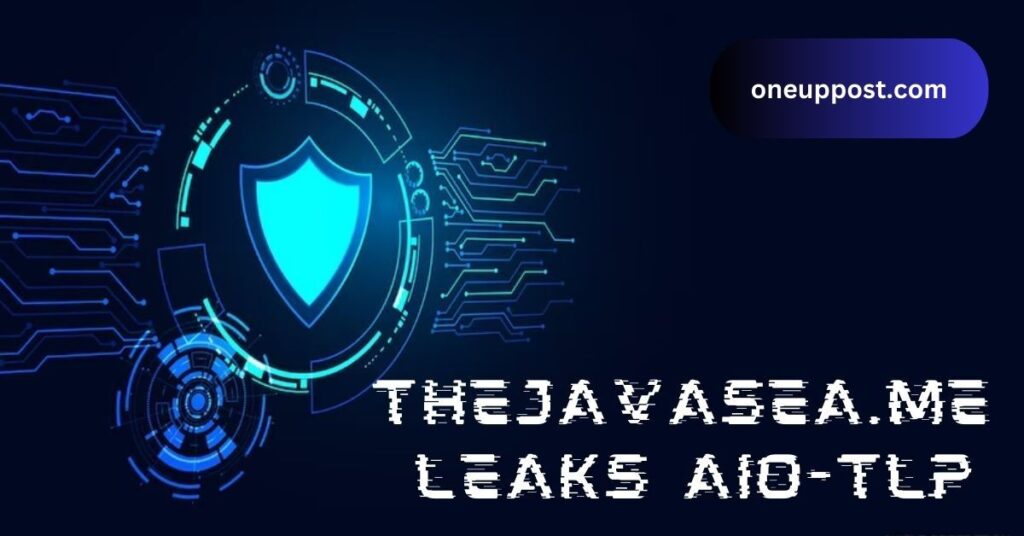Thejavasea.Me Leaks Aio-Tlp – A Comprehensive Guide!

A few years ago, I faced a situation that eerily mirrors the thejavasea.me leaks AIO-TLP incident. I was going about my usual routine when I received an email notification that one of my accounts had been compromised. At first, I thought it was just another phishing attempt, but as I dug deeper, the reality hit me—I had become a victim of a data breach.
Thejavasea.me leaks AIO-TLP is a significant data breach affecting sensitive information, highlighting the urgent need for stronger cybersecurity practices. Individuals and organizations must take proactive steps to secure their digital assets. This incident serves as a wake-up call to the vulnerabilities in our online lives.
Introduction To Thejavasea.Me Leaks Aio-Tlp:
In today’s digital age, data leaks and breaches have become common, affecting individuals and organizations alike. One of the recent incidents that have garnered significant attention is the “thejavasea.me leaks AIO-TLP.” This article aims to provide an in-depth look at this event, offering insights, analysis, and practical advice for those affected or interested in understanding the situation.
What Is Thejavasea.Me?
Thejavasea.me is a lesser-known website that recently made headlines due to a significant data leak. Although not as prominent as other platforms, it has caught the attention of cybersecurity experts and internet users alike. The site was reportedly hosting various types of content, including sensitive information that should not have been publicly accessible.
1. Understanding Aio-Tlp:
AIO-TLP stands for “All In One – Traffic Light Protocol.” This term is typically used in cybersecurity to classify the sensitivity of information. The Traffic Light Protocol (TLP) is a set of designations used to ensure that sensitive information is shared appropriately. The colors in TLP—red, amber, green, and white—indicate how information should be shared and with whom. In this context, “AIO” likely refers to an aggregation or compilation of data categorized under different TLP levels.
2. The Significance Of Thejavasea.Me Leaks Aio-Tlp:
The leak of AIO-TLP data on thejavasea.me is particularly alarming because it suggests that a wide range of sensitive information, possibly from multiple sources, was compromised. This type of leak can have far-reaching consequences, not just for individuals but for organizations and governments as well. The nature of the data and the ease with which it could be accessed have raised serious concerns about digital security.
3. Impact On Individuals:
For individuals, the exposure of personal information can lead to identity theft, financial loss, and even emotional distress. The data leaked may include anything from email addresses and passwords to more sensitive information such as social security numbers or private communications. Those affected by the leak are advised to take immediate steps to secure their accounts and monitor their financial transactions for any unusual activity.
4. Impact On Organizations:
Organizations are equally at risk from such data leaks. The exposure of confidential business information can lead to financial loss, reputational damage, and legal repercussions. Companies whose data was compromised in thejavasea.me leaks AIO-TLP should conduct thorough investigations to determine the extent of the breach and implement stronger security measures to prevent future incidents.
5. The Role Of Cybersecurity:
The thejavasea.me leaks AIO-TLP incident underscores the importance of robust cybersecurity practices. As data breaches become more sophisticated, the need for advanced security measures becomes increasingly critical. Companies and individuals alike must prioritize cybersecurity to protect sensitive information from being leaked or stolen.
How To Protect Yourself From Data Leaks:
To protect yourself from data leaks, start by using strong, unique passwords for each of your accounts. Employ two-factor authentication (2FA) wherever possible to add an extra layer of security. Regularly update your software and apps to patch any vulnerabilities that could be exploited. Be cautious with emails and links, avoiding any that seem suspicious or ask for personal information.
Utilize a reliable Virtual Private Network (VPN) to encrypt your online activity and shield it from prying eyes. Regularly monitor your financial statements for any unusual transactions. Finally, consider using a password manager to keep track of your passwords securely and ensure they are both complex and unique.
- Use Strong Passwords: Avoid using the same password across multiple sites. Use a mix of letters, numbers, and special characters.
- Enable Two-Factor Authentication (2FA): This adds an extra layer of security to your accounts.
- Regularly Update Software: Keep your operating system, browser, and apps updated to protect against known vulnerabilities.
- Be Wary of Phishing Scams: Be cautious of emails or messages that ask for personal information.
- Use a VPN: A Virtual Private Network can help protect your online activity from being monitored or intercepted.
1. The Aftermath Of The Leak:
In the wake of thejavasea.me leaks AIO-TLP, many affected individuals and organizations have had to take quick action to mitigate the damage. This includes resetting passwords, monitoring financial statements, and even reaching out to legal experts for advice. The leak has also sparked a broader conversation about the state of cybersecurity and the need for more stringent regulations to protect sensitive data.
2. Legal Implications:
The legal implications of thejavasea.me leaks AIO-TLP are still unfolding. Depending on the nature of the leaked data and the jurisdictions involved, there could be significant legal consequences for those responsible for the breach. Additionally, affected parties may have the right to seek legal recourse if they suffer damages as a result of the leak.
3. Preventing Future Leaks:
Preventing future leaks requires a proactive approach to cybersecurity. This means not only implementing the latest security technologies but also fostering a culture of security awareness. Organizations should regularly train employees on how to recognize and respond to potential security threats. Additionally, companies should conduct regular security audits to identify and address vulnerabilities before they can be exploited.
4. The Importance Of Transparency:
Transparency is key in the aftermath of a data leak. Organizations should be open about the nature of the breach, the steps they are taking to address it, and how they plan to prevent future incidents. This not only helps to rebuild trust with affected parties but also sets a positive example for other organizations facing similar challenges.
FAQ’s:
1. What Is Thejavasea.Me?
Thejavasea.me is a website that gained attention due to a significant data leak involving sensitive information.
2. What Does Aio-Tlp Stand For?
AIO-TLP stands for “All In One – Traffic Light Protocol,” a term used in cybersecurity to classify the sensitivity of information.
3. How Can I Protect Myself From Data Leaks?
Protect yourself by using strong passwords, enabling two-factor authentication, updating software regularly, being cautious of phishing scams, and using a VPN.
4. What Should I Do If My Information Was Leaked?
If your information was leaked, take immediate steps to secure your accounts, monitor financial transactions, and consider reaching out to a legal expert for advice.
5. What Are The Legal Implications Of Thejavasea.Me Leaks Aio-Tlp?
The legal implications are still unfolding, but there could be significant consequences for those responsible for the breach, as well as potential legal recourse for affected parties.
Conclusion:
The thejavasea.me leaks AIO-TLP incident serves as a stark reminder of the importance of cybersecurity in today’s digital world.
As data breaches become more common and more sophisticated, individuals and organizations must take proactive steps to protect their sensitive information.
By understanding the nature of the leak and taking the necessary precautions, we can mitigate the impact of such incidents and work towards a safer online environment.





